The Schnoodle Puppies, a delightful crossbreed between the Miniature Schnauzer and the Poodle, combines the best traits of both parent breeds. These intelligent, social, and playful dogs make excellent family companions. Let’s explore the key aspects of Schnoodle puppies.
The Origin of Schnoodle Puppies
Schnoodles are a relatively new breed that first gained popularity in the 1980s. The purpose behind creating this crossbreed was to combine the Schnauzer’s alertness and loyalty with the Poodle’s intelligence and non-shedding coat. The result is a dog with a friendly and affectionate nature, perfect for families and individuals alike.
Basic Info
| Aspect | Details |
|---|---|
| Traditional Colors | Solid black, white, cream, apricot, brown/chocolate, red, tan, gray, black and white combinations, salt and pepper, parti, merle, sable, phantom. |
| Weight | Ranges from 6 to 75 pounds, depending on parent sizes. |
| Size | Varies based on parentage: Miniature Schnauzer × Toy Poodle = Tiny; Giant Schnauzer × Standard Poodle = Large. |
| Dog Height | Varies, but typically small to medium-sized. |
| Life Span | 12-16 years on average. |
| Price | Varies; consider adoption from reputable breeders or shelters. |
| Suitable For | Families, singles, and therapy work. |
Physical Appearance
| Feature | Description |
|---|---|
| Facial Structure | Expressive eyebrows, Schnauzer-like beard. |
| Coat | Soft to touch, wavy to curly, hypoallergenic. |
| Nose | Varies in color, depending on coat. |
| Eyes | Dark, expressive, almond-shaped. |
| Ears | Medium-sized, set high, fold over. |
| Muzzle | Schnauzer-like, strong. |
| Body | Compact, muscular, athletic. |
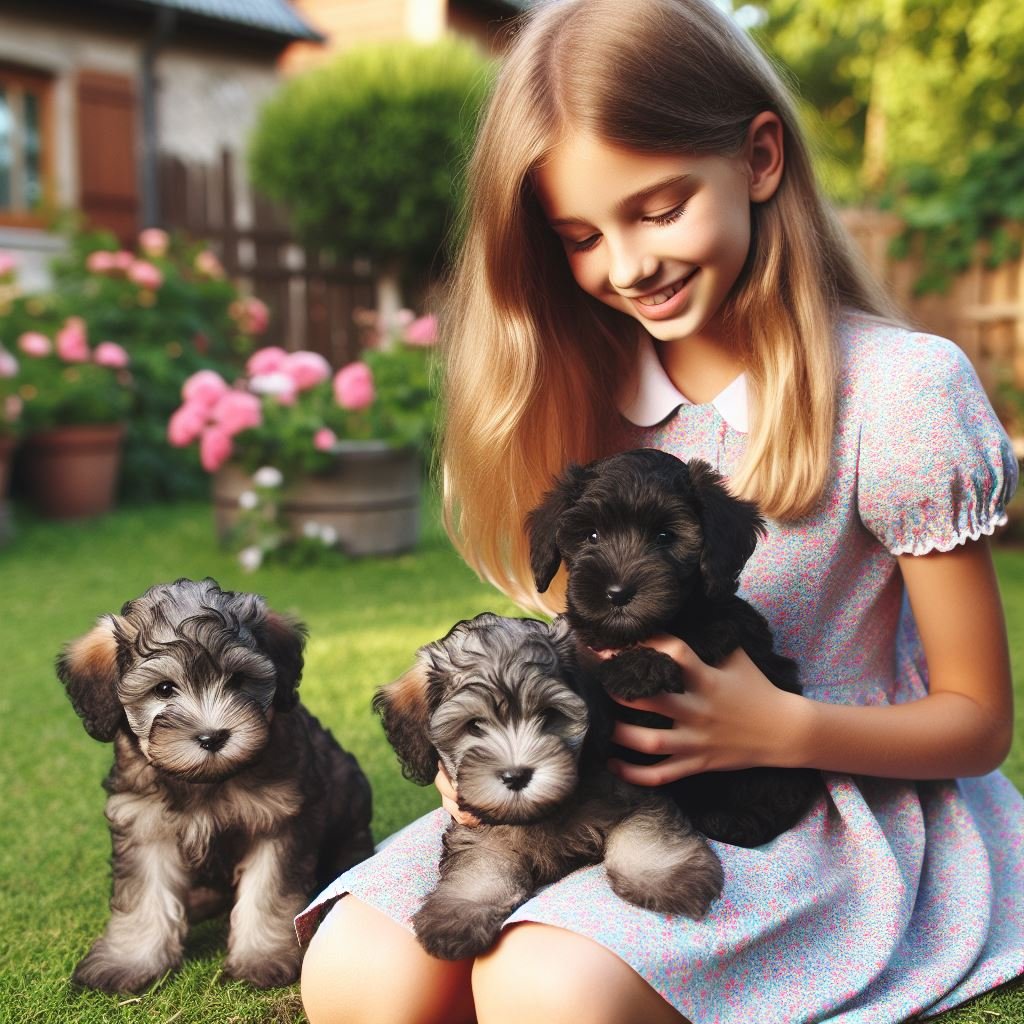
Schnoodle Puppies with girl in home garden
Quick Facts
| Trait | Details |
|---|---|
| Temperament | Social, intelligent, eager to please. |
| Reproduction | Schnoodles are a first-generation crossbreed. |
| Playtime | Requires daily exercise and mental stimulation. |
| Intelligence | Quick learners, great problem solvers. |
| Evolutionary Origins | Descendants of working breeds (Schnauzer and Poodle). |
| Genetics | Inherit hypoallergenic trait from Poodle parent. |
| Breed Group | Not recognized by AKC, but popular among dog lovers. |
Games
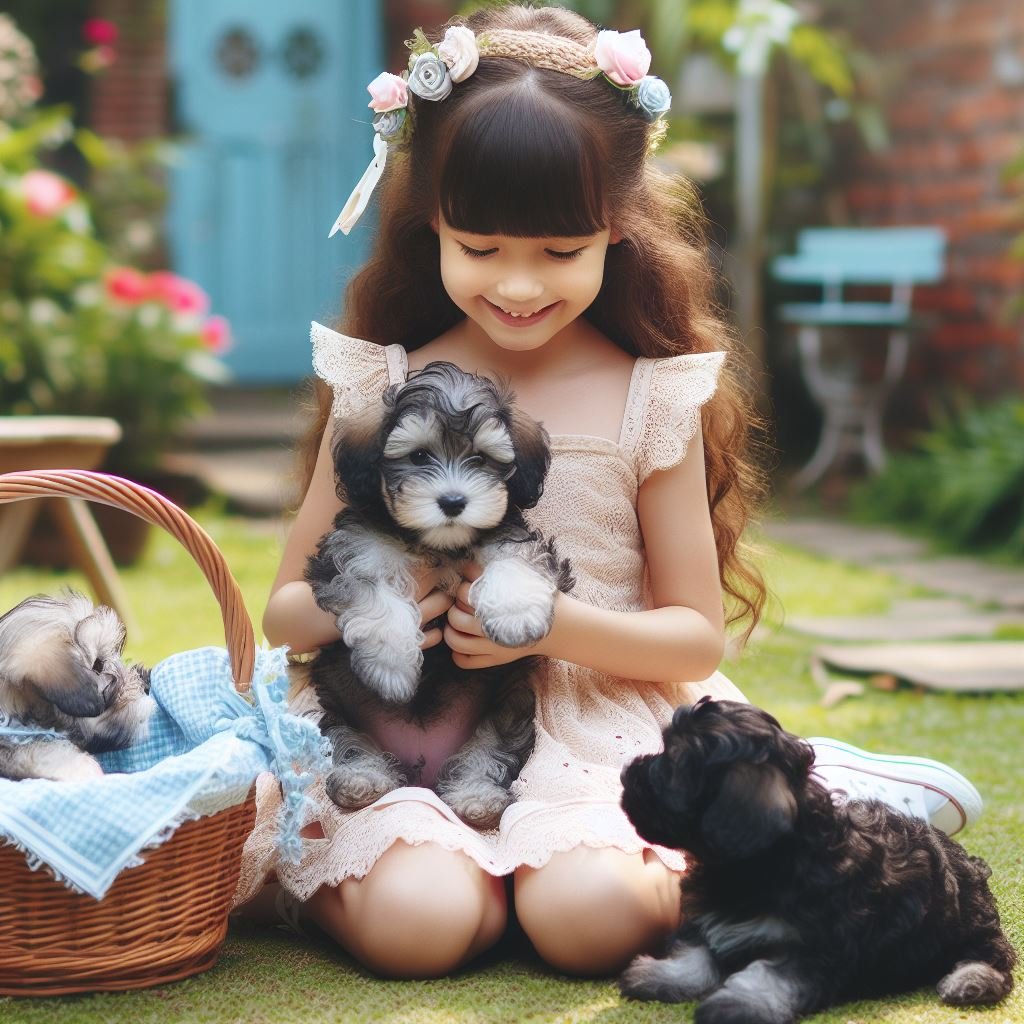
Schnoodle Puppies are playing with girl
| Indoor | Outdoor |
|---|---|
| Hide-and-seek | Fetch (with frisbee or ball). |
| Puzzle toys | Agility courses. |
| Treat-dispensing toys | Swimming (if trained). |
Special Key Points
| Aspect | Details |
|---|---|
| Adaptability | Thrive in various environments. |
| Senses | Excellent sense of smell. |
| Sleep Patterns | Varies, but typically adaptable. |
| Loyalty | Devoted to families and owners. |
Characteristics of Schnoodle Puppies
Schnoodle puppies inherit a variety of traits from their Schnauzer and Poodle parents. Here are some of the key characteristics you can expect from these adorable pups:
Intelligence:
Both Schnauzers and Poodles are known for their intelligence, and Schnoodles are no exception. They are quick learners and highly trainable, making them a great choice for first-time dog owners or those who enjoy teaching their pets new tricks.
Hypoallergenic Coat:
One of the most appealing features of Schnoodle puppies is their hypoallergenic coat. This means that they produce fewer allergens, making them a suitable option for individuals with allergies. Their low-shedding coat also means less time spent vacuuming up pet hair!
Playful and Energetic:
Schnoodles have a playful and energetic nature, making them excellent companions for active individuals or families with children. They love to play fetch, go for walks, and engage in interactive games, making them an ideal choice for those who enjoy an active lifestyle.
Affectionate and Loyal:
Schnoodles are known for their affectionate and loyal nature. They form strong bonds with their owners and thrive on human companionship. They make great family pets and are also well-suited to individuals or couples looking for a loving and devoted companion.
Dog Food and Diet Requirements
- Choose high-quality dog food with balanced nutrition.
- Consult your vet for specific dietary recommendations.
- Avoid overfeeding to prevent obesity.
Communication
- Schnoodles are vocal and expressive.
- They bark to alert or communicate their needs.
- Learn to interpret their body language.
Read More: The Importance of Dog socialization
Care Taker
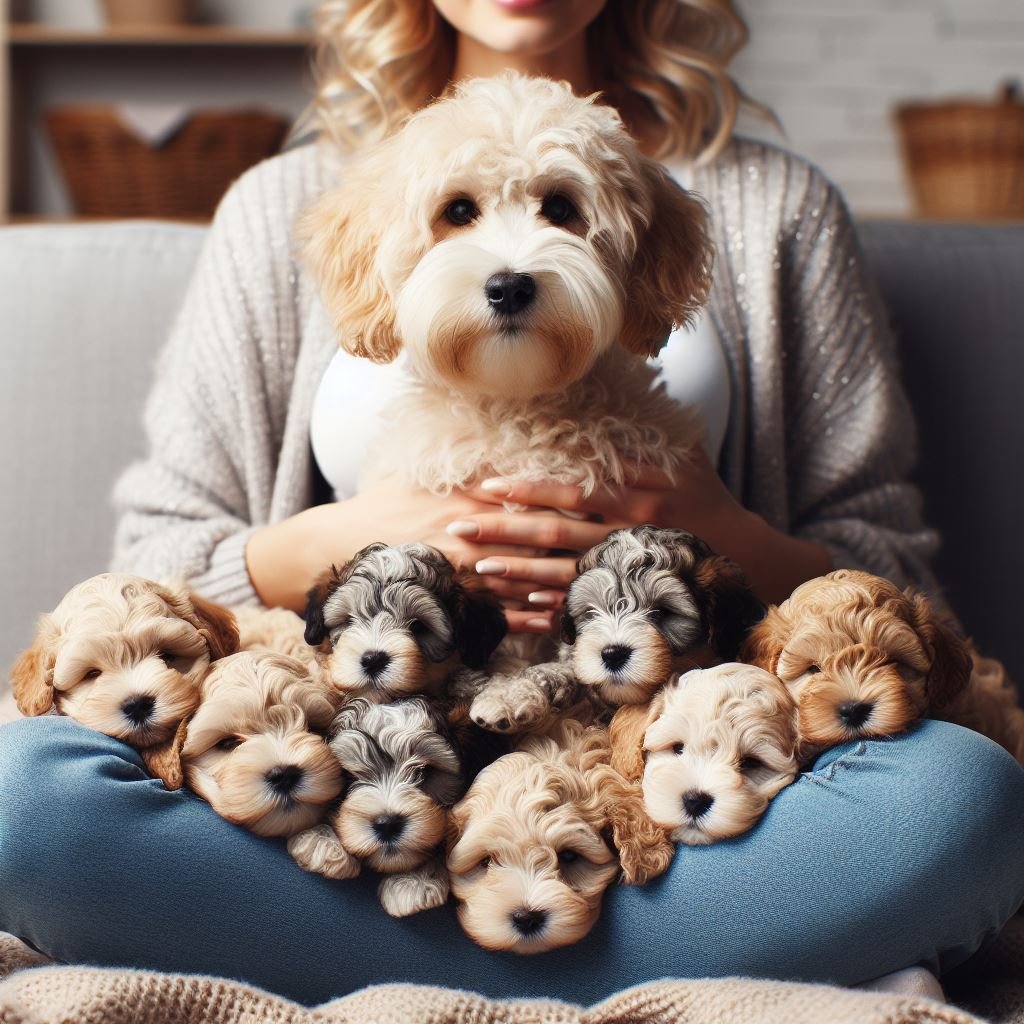
Schnoodle Puppies with caretaker
- Responsible ownership includes regular vet visits, vaccinations, and preventive care.
- Provide a safe and loving environment.
- Be patient and understanding.
How to Recognize Them?
- Schnoodles have a distinctive wavy or curly coat.
- Their expressive eyes and Schnauzer-like beard are recognizable features.
- Look for a compact, athletic body with a friendly demeanor.
Male vs. Female: Is There Any Difference?
- Personality traits can vary, but there’s no significant difference in behavior.
- Neutering or spaying can influence behavior and health.
- Choose based on individual temperament and compatibility.
Caring for Your Schnoodle Puppy
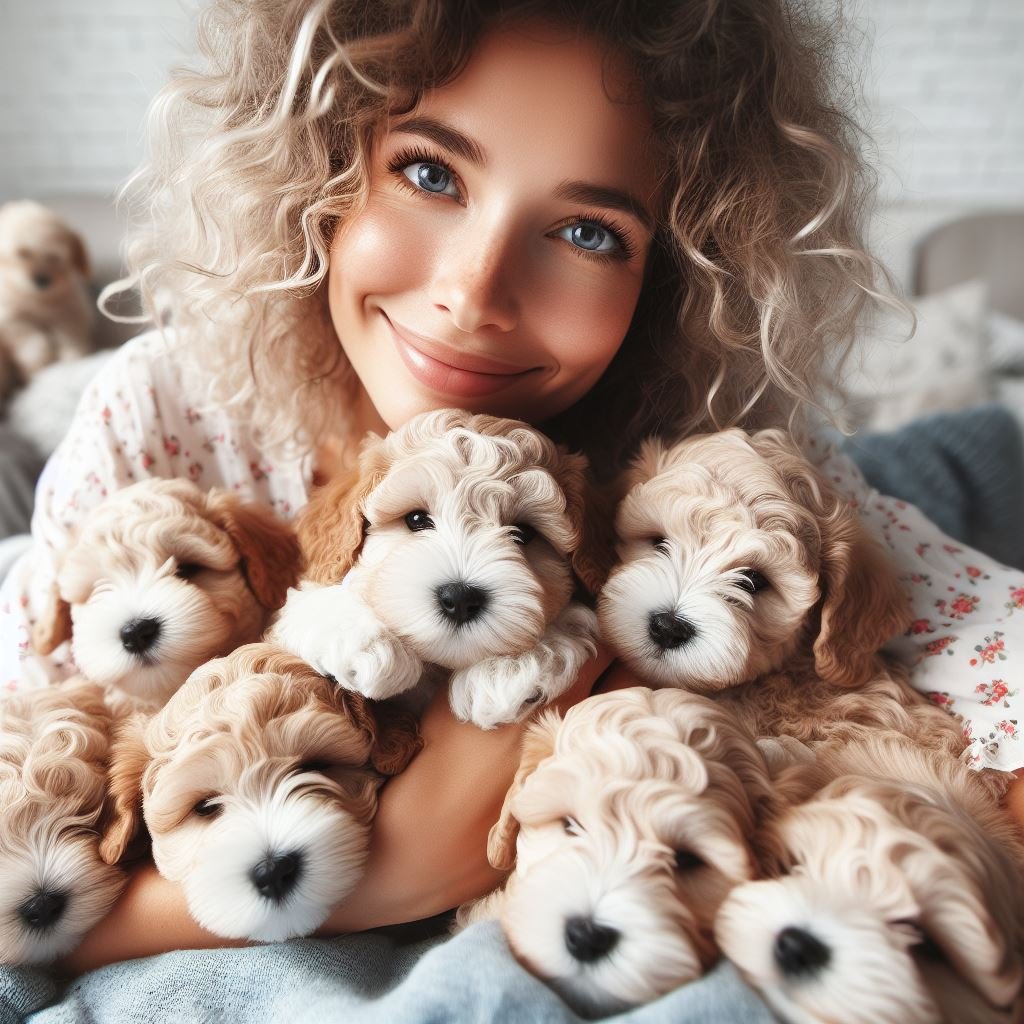
Schnoodle Puppies taking caring
Like any other dog, Schnoodle puppies require proper care and attention to thrive. Here are a few tips to help you provide the best care for your new furry friend:
Regular Exercise:
Schnoodles have a moderate energy level and require regular exercise to keep them happy and healthy. Daily walks, playtime, and mental stimulation through training or puzzle toys are essential to prevent boredom and ensure they get the exercise they need.
Grooming:
While Schnoodles have a low-shedding coat, regular grooming is still necessary to keep their fur free from tangles and mats. Brushing their coat a few times a week and scheduling regular professional grooming appointments will help maintain their coat’s health and appearance.
Read More: The Art of Dog Grooming
Training and Socialization:
As intelligent dogs, Schnoodles benefit from early training and socialization. Enroll them in puppy training classes to learn basic commands and proper behavior. Expose them to different environments, people, and other animals to ensure they grow up to be well-rounded and confident dogs.
Health Care:
Regular veterinary check-ups, vaccinations, and preventive care are essential for your Schnoodle’s well-being. Discuss with your veterinarian the appropriate vaccination schedule, flea and tick prevention, and any other health concerns specific to your dog’s breed.
Read More: Common Health Issues in Dogs
Health Issues
Schnoodles are generally healthy dogs, but like all breeds, they can be prone to certain health conditions. Regular veterinary check-ups are essential to monitor their well-being. Common health issues include:
- Hip Dysplasia: A genetic condition affecting the hip joint.
- Eye Problems: Schnoodles may develop cataracts or progressive retinal atrophy.
- Allergies: Some Schnoodles are sensitive to certain foods or environmental allergens.
- Dental Health: Regular brushing and dental care are crucial.
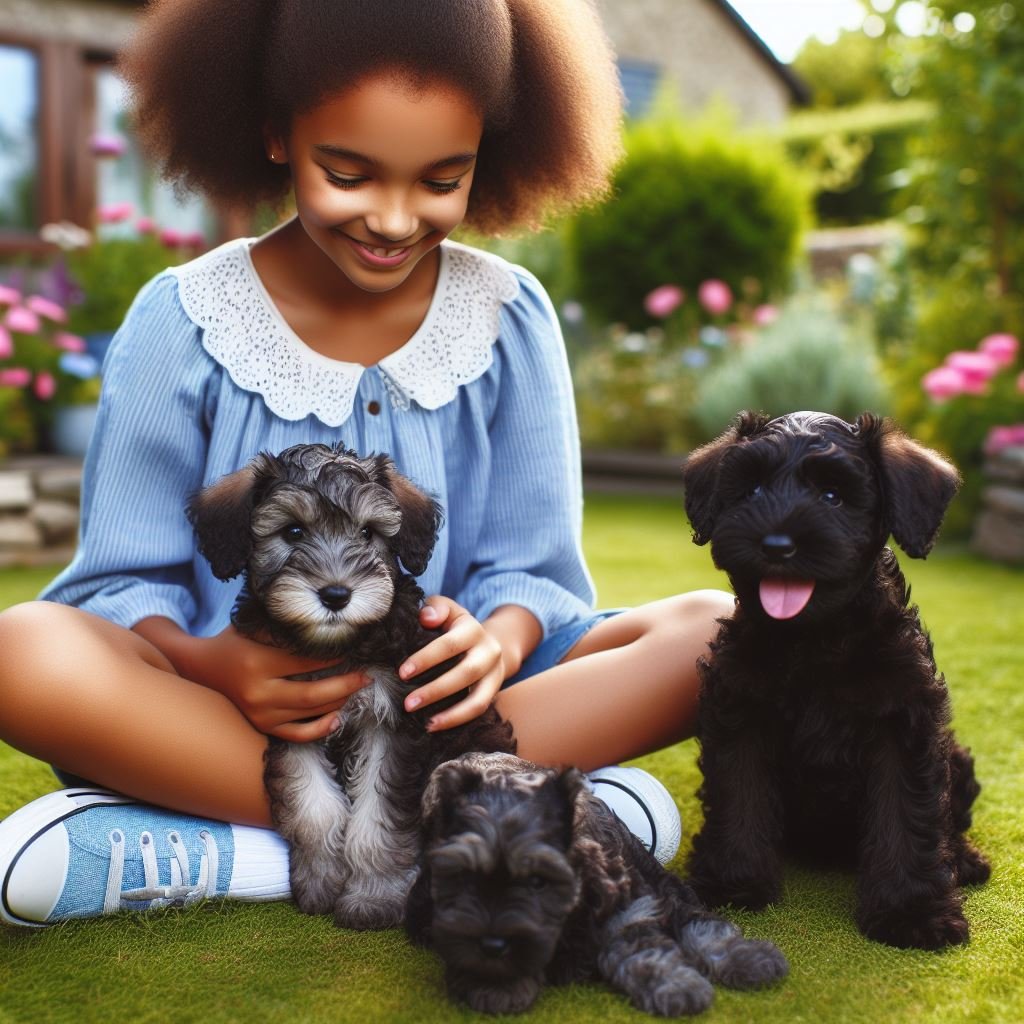
Schnoodle Puppies are seating with girl in garden
Where to Find Schnoodle Puppies
If you have decided that a Schnoodle puppy is the perfect addition to your family, you may be wondering where to find one. There are several options available:
1. Breeders:
Research reputable Schnoodle breeders in your area who follow ethical breeding practices. Visit their facilities, ask questions, and ensure that the puppies are well-cared for and raised in a loving environment.
2. Rescue Organizations:
Consider adopting a Schnoodle puppy from a rescue organization or local shelter. Many Schnoodles and Schnoodle mixes are in need of loving homes. By adopting, you not only give a deserving dog a second chance but also free up space in the shelter for another animal in need.
3. Online Platforms:
There are various online platforms where breeders and individuals advertise Schnoodle puppies for sale. However, exercise caution and thoroughly research the seller’s reputation before making any commitments.
Helpful YouTube Link: Schnoodle Pups – YouTube
Conclusion
Schnoodle puppies are a delightful mix of Schnauzer and Poodle, combining the best traits of both breeds. With their intelligence, hypoallergenic coat, and affectionate nature, they make wonderful companions for individuals and families alike. Remember to provide them with the love, care, and attention they need to thrive, and you will have a loyal and loving companion by your side for many years to come.
Frequently asked questions (FAQs) about Schnoodle Puppies:
How do I recognize a Schnoodle?
Look for:
Wavy or curly coat
Expressive eyes
Schnauzer-like beard
Compact, athletic body.
What sports or activities do Schnoodles enjoy?
Some Schnoodles thrive in the limelight and excel in dog sports such as:
Agility
Flyball
Obedience
Rally.
How should I care for my Schnoodle?
Grooming: Regular brushing and professional grooming are essential.
Training: Begin socialization and training early using positive reinforcement techniques.
Exercise: Schnoodles need daily walks or active playtime.
Health: Regular vet check-ups and a balanced diet are crucial.
Socialization: Introduce them to various people and environments.
What are the key personality traits of Schnoodles?
Schnoodles are:
Energetic
Intelligent
Protective
Affectionate
Adaptable
Good with children and other dogs
Moderate exercise needs
Low shedding
Territorial watchdogs.
How long do Schnoodles live?
The lifespan of a Schnoodle can vary based on their size. On average, they live between 10 to 16 years. Regular veterinary care and a healthy lifestyle contribute to their longevity.
What is a Schnoodle?
A Schnoodle is a delightful crossbreed between a Miniature Schnauzer and a Poodle. These charming dogs combine the intelligence of both parent breeds and often have a curly coat that requires regular grooming. They make excellent companions and watchdogs.

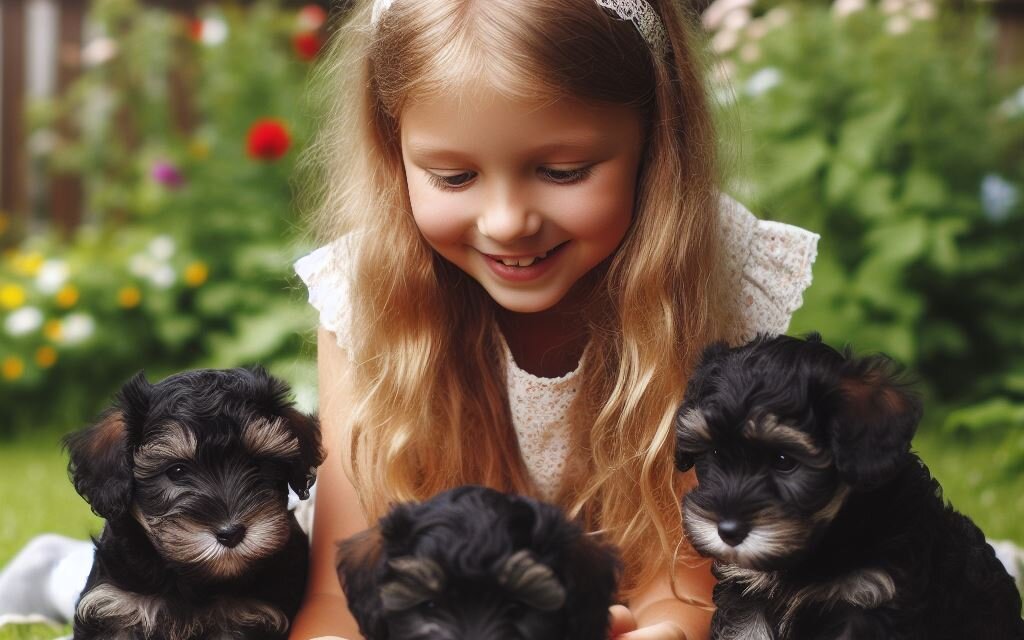
 Mini Labradoodle: A Complete Guide
Mini Labradoodle: A Complete Guide 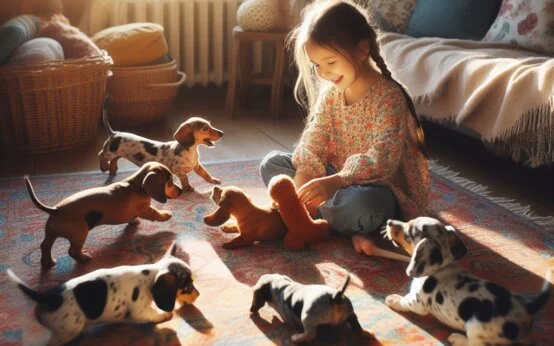 Dapple Dachshund: A Unique and Lively Breed
Dapple Dachshund: A Unique and Lively Breed 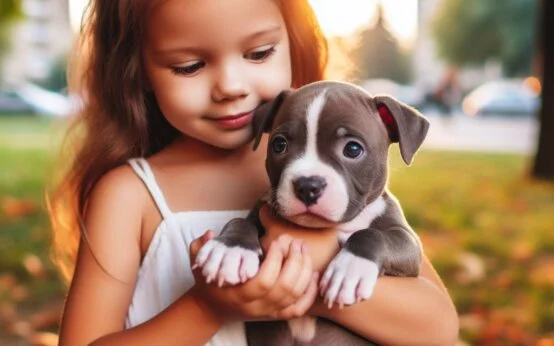 Pocket Pitbull: A Compact Canine Companion
Pocket Pitbull: A Compact Canine Companion 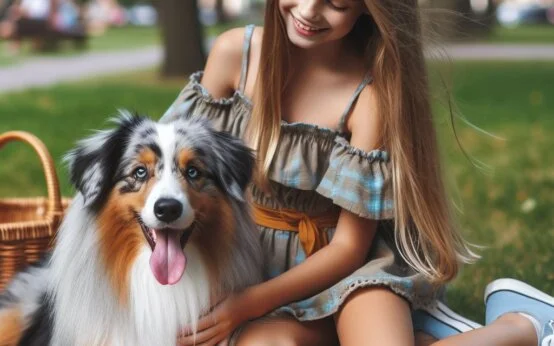 The Blue Merle Australian Shepherd: A Captivating and Unique Breed
The Blue Merle Australian Shepherd: A Captivating and Unique Breed 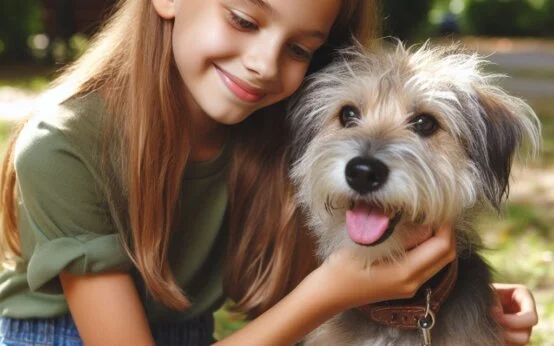 Terrier Mix: A Versatile and Energetic Canine Companion
Terrier Mix: A Versatile and Energetic Canine Companion 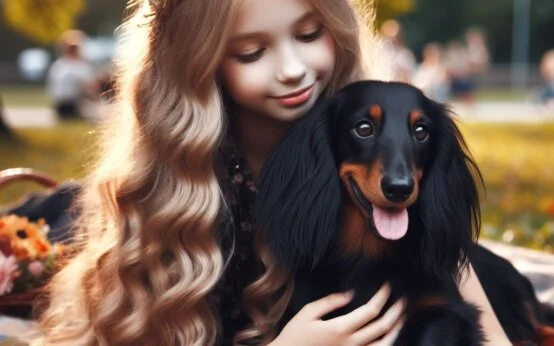 Long Haired Dachshund: A Guide to This Charming Breed
Long Haired Dachshund: A Guide to This Charming Breed  Mini Labradoodle: A Complete Guide
Mini Labradoodle: A Complete Guide 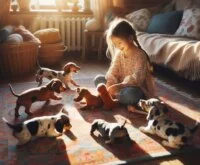 Dapple Dachshund: A Unique and Lively Breed
Dapple Dachshund: A Unique and Lively Breed  Pocket Pitbull: A Compact Canine Companion
Pocket Pitbull: A Compact Canine Companion  Preparing for an Adventure: A Golden Retriever Packs Its Suitcase
Preparing for an Adventure: A Golden Retriever Packs Its Suitcase 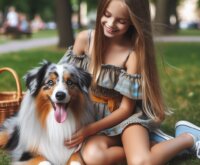 The Blue Merle Australian Shepherd: A Captivating and Unique Breed
The Blue Merle Australian Shepherd: A Captivating and Unique Breed 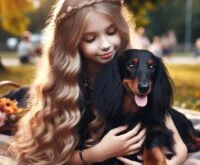 Long Haired Dachshund: A Guide to This Charming Breed
Long Haired Dachshund: A Guide to This Charming Breed